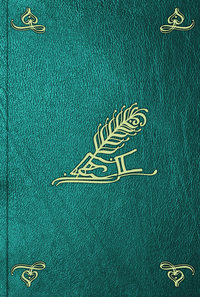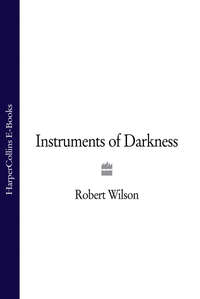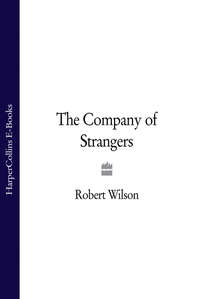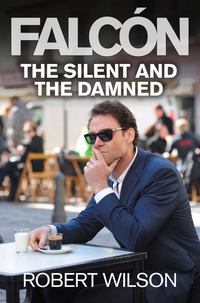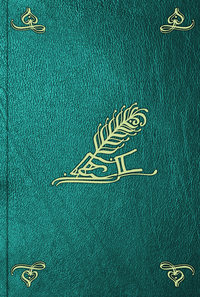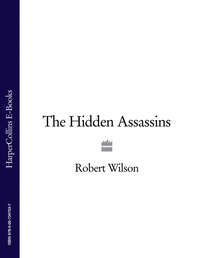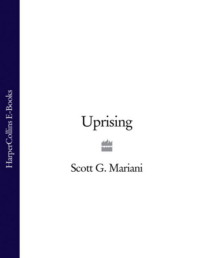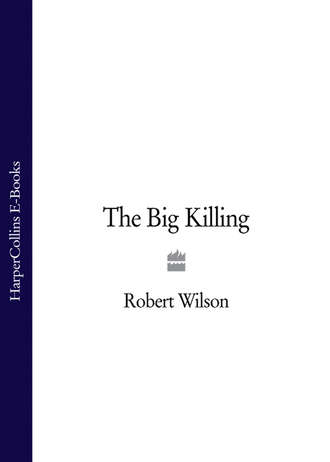
Полная версия
The Big Killing
‘You, Moses.’
He clapped his hands and laughed at this and went through a succession of deep thoughts without finding the hidden meaning.
In an ideal world Heike would come back. Something awkward and sharp amongst all the food that B.B. shovelled into himself would get caught in his throat and he’d pass on into a better world. Bagado would get his job back in the police force. Helen’s uncle would get better. I’d get some decent work and Moses would get a short sharp dose of the clap. Only the latter was a serious possibility.
So, I was bored – bored and broke. I needed something to do to take my mind off the things that were causing my brain to plod in tight circles, finding no answers to questions which didn’t have any. I needed money. Fat Paul made out he was going to solve both problems.
In the late afternoon I went for a nap in my cheap room in a house on the furthest outskirts of Grand Bassam. It was a narrow cell on the flat roof of an old unpainted concrete block which had no glass in any of the windows and whose shutters had been used for firewood a long time ago.
After I’d jerked awake for the seventh time it was dark. I got up and took two shots of whisky as a mouthwash and then another two to cure the motion sickness. I called B.B. and he gave me the ‘wall small’ routine again. I didn’t bother to check my answering machine at home in Cotonou, Benin, and instead I hit a place with beer and loud music called Le Cafard, the cockroach, a real sleazy joint for men who didn’t shave and women who smelled strongly of cheap sex. I had shaved and I didn’t buy any cheap sex, but people could tell I had the right temperament for the bar. I had le cafard, the blues, and they let me alone to get on with it.
I put away the last quarter of the bottle of whisky when I got back to my room and fainted into sleep, which came in short bursts of violent dreaming, and starts awake in blue-white flashes with instant fears of death, like travelling on a runaway subway train. I woke up face down, twisted in the sheet with sweat cold on my bare back. In the room the darkness was blacker than evil and the mosquitoes had found a note rarely played on the violin which stretched the brain to the thinness of fuse wire. I waited for dawn to paint itself into the room while I marvelled at the size and leatheriness of my tongue.
The bender, which I’d decided was my last, did me some good. I reckoned I’d bottomed out, which worried me because that was what politicians said about economic recessions when there was still some ways to go. I wrote down some pros and cons for doing Fat Paul’s work for him and although his offer still looked as attractive as a flophouse mattress, it was beginning to show some merits. You could sleep on it as long as you held your nose and it would only be for one night.
Sunday 27th October
‘You got it,’ said Fat Paul after we’d been through the drop details for the third time. He leaned over his sloping gut to slap the table top but didn’t make it. He settled a jewel-bitten hand on one of his pappy breasts.
He was dressed in the usual five square metres of face-slapping material. The blue and the white parakeets was off today. It was the red with green monkeys for Sunday. He snarled at Kwabena for a cigarette and took a handkerchief out and polished his face with it.
We were sitting at a table in my corner of the bar, which had annoyed Fat Paul because he had his back to the door and I had an angled view out of it down the beach to the sea. It was just coming up to one o’clock but Fat Paul had lost his appetite, maybe because it was hotter than yesterday with no rainfall for the last couple of days, or maybe he didn’t like his back unprotected. He only ordered four pineapple fritters.
‘It’s not what you’d call a regular piece of business,’ I said.
‘How so?’
‘One, the money. Two, the location for what you call “the drop”. Three, the contents of the envelope. Four, the characters involved.’
‘Characters?’ he asked.
‘Fat Paul, Silent George, Colossal Kwabena.’
‘Colossal?’
‘Very big.’
‘Is good word. I like it. Colossal,’ he said, trying it out for size. Then he changed, getting aggressive. ‘Whass wrong these people?’
‘What do George and Kwabena do?’
‘They my bodyguards.’
‘That’s my point,’ I said. ‘Why do you need your body guarded?’
‘I’m not so quick on my feet.’
‘Why do you need to be quick?’
‘I make money.’
‘Doing what?’
‘Videos.’
‘You got an office?’
He handed me a card which gave the company name as Abracadabra Video, Adabraka and an address on Kojo Thompson Road in Accra, Ghana. The company ran video cinemas. They specialized in showing action movies, mainly kickboxer, to local neighbourhoods. It was a lucrative business, there was a high cash turnover and hardly any overheads. A lot of people were interested in taking over the business but not paying for it. Kwabena provided the muscle to persuade them otherwise and if he couldn’t cope George leaned in with the old metal dog leg and people quietened down, talked sensible, played cards and drank beer as if nothing had been further from their mind.
‘You look like shit,’ said Fat Paul, irritated now and trying another strategy. Trying to get tough with a line I hadn’t heard before.
‘My mother loves me,’ I said without looking up.
‘You got no money,’ he said. ‘No money to chop.’
‘How do you know, Fat Paul?’
‘You let me buy you chop.’
‘You have to pay for what you want. Lunch lets you sit at the same table.’
‘You not workin’ for you’self.’
‘How do you know that too, Fat Paul?’
‘No self-respect,’ he said.
‘I suppose you think you know me pretty well?’
‘I know shit when I see it.’
‘I’ve got a good eye for it myself,’ I said, looking at his brow which was swollen as if recently punched. Beneath it his eye sockets had no contour and his piggy peepers looked black and aware. Sweat ran down his cheeks as if he was crying. He didn’t look as if anything could hurt him unless you tried to take away his plate.
‘You just give the man the package…’ intoned Fat Paul. I held up my hand.
‘Thanks, I’ve got it. Listen…’
‘No, no,’ he said. ‘You listen. First I show you where you mek the drop, out Abidjan west side, down by the lagoon Ebrié in pineapple plantation. You go there in the afternoon. The man he comin’ from the north, he comin’ late, he only get there after dark. You check the place, mekkin’ sure you comfortable. Then go down Tiegba side fifteen-minute drive, nice bar, you waitin’ there, the other man come. Relax some, drink beer, look at the lagoon. They’s a village there on legs, ver’ nice, the tourists like’t ver’ much. Then the time come. You ver’ smooth now widde beer and the pretty place an’ you gettin’ in you car an mek the drop. ‘S very easy thing, you know.’ He sat back and put a hand up to his face and dipped the little finger in the corner of his mouth.
‘Most nights,’ I said, ‘my motor reflexes put on a good show. I wake up in the mornings alive even if I don’t feel it. Then, if I haven’t been kissing the bottle too hard I find I have the coordination to stand up and move around. Getting somewhere, putting my hand inside my shirt and pulling out a package and giving it to someone is a cinch for a man with my kind of skills. What’s more, I have the in-built ability to take something with my left hand while I’m giving something else with my right. I can also count and eat a biscuit at the same time, but you tell me this job doesn’t take such talent.’ I stopped while Fat Paul’s lip took on another cigarette. ‘Now you’re beginning to see you’re talking to someone who’s done a few things in life. Someone who knows the difference between a French-restaurant cheese and a curl of dogshit, someone who knows where the grass is greenest there’s twenty years of slurry underneath. So don’t pretend to me that this job’s a snap. Don’t tell me about relaxing with beers and a tourist village on legs and all I’ve got to do is give a man a package when the postman does it every day and nobody gives him two hundred and fifty thousand CFA. Don’t tell me there’s no snags when there’s money…’
‘Snags?’ Fat Paul interrupted. ‘What are these snags?’
‘Snags are problems, difficulties, obstacles.’
‘Snags,’ said Fat Paul, weighing the word on his tongue and giving me a good idea of what a cane toad with a bellyful of insects looks like. ‘Lemme write these snags down.’
He reached around him for a pen and paper and then pretended to write on the palm of his hand. He knew we were coming to it now. I could see him blinking the shrewdness out of his eyes.
‘Are you blackmailing somebody, Fat Paul?’ I asked.
‘Keep you voice down,’ he said, looking up at the barman who didn’t understand English. ‘Blackmail? I not blackmailin’ nobody. This no blackmailin’ thing. This a secret thing is all.’
‘What sort of secret?’
‘I’m tellin’ you that, it no a secret no more.’
‘I asked you what sort of secret, not what it is. Personal secret, political secret, economic secret, arms secret…?’
‘Is a business secret.’
‘Show me the cassette.’
Fat Paul surprised me by flicking his fingers at Kwabena, who took the package out from under his shirt and gave it to him. With one eye closed to the cigarette smoke he broke the wax seal on the package, took out a wad of paper around the cassette, threw the empty envelope on the table. The heavy-duty envelope was still addressed to M. Kantari, Korhogo. He handed me the cassette. There was nothing unusual about it. The cassette didn’t look as if it had been tampered with or opened. I couldn’t see anything in it apart from 180 minutes of magnetic tape.
‘See?’ said Fat Paul.
I folded the wad of paper around the cassette, put it back in the envelope and handed it back to Fat Paul, shaking my head.
‘Now you jes’ tell me two things,’ said Fat Paul, ready for it now and finished with the game. ‘One, if you gonna do it. Two, how much you wan’ for doin’ it.’
‘A million,’ I said, ‘CFA. Four thousand dollars, you understanding me?’
The quality of the silence that followed could have been exported to any library in the world. George glanced across Fat Paul’s inflammable hair at Kwabena who looked as if he’d taken a blow from a five-pound lump hammer and was wondering whether to fall backwards. Fat Paul clasped his bratwurst fingers with the implanted rings and checked his watch, not for the time but because it seemed to be hurting him, cutting into his forearm. He pushed it down to this wrist and shook it. He breathed and kissed in the smoke from the glued cigarette on his lip in little puffs. He breathed out and the smoke baffled over his bottom lip.
‘Too much. We find cheaper white man.’
‘Go ahead. It’d be interesting to see the one you get who’s going to make a drop of a ‘video of a business secret’ at night in the middle of nowhere with money involved and at seven hours’ notice, unless you can delay it some more?’
Fat Paul suddenly started to manage his hair with both hands like a forgetful toupé-wearer. He settled back down again.
‘Seven hundred and fifty…’ he started and I shook my head. He knew it. I had him down on the floor with both feet on his fat neck.
‘Show him the place,’ he said, smiling, and in that instant I saw that he thought he had won. He clicked it away with his fingers and Kwabena produced a stick of red sealing wax and a lighter and melted off a pool on to the envelope. Fat Paul planted his ring in it as it cooled and then blew on his finger.
‘I need some expenses.’
‘For a million CFA, you supplyin’ you own expenses.’
‘So where do we meet tomorrow?’ I asked. ‘Grand Bassam, one o’clock. There’s an old warehouse lagoon side Quartier France, near the Old Trading Houses. You see the car. You find us.’
Chapter 3
Time was speeding up, now that the theoretical pay scale had jumped a few points, so I went back to my room and lay down to get used to it. There was a lot to do if I didn’t want to drift into this exchange unprepared and I reckoned some thinking might help and, although I could do it on my feet, I preferred to be on my back with something liquid in a glass on my chest.
I didn’t want to use my own car for the drop. It was a mess, which attracted attention, and it had Benin plates which are beacon red on a white background. I’d have to hire a car. My Visa card was in a hospital burns unit somewhere recovering from a seared hologram and couldn’t take a day’s car hire without going into intensive care. B.B. was going to have to be tapped. If he didn’t come through then I was going to have to rely on the money from the drop materializing. If it did, I could pay the car hire but I was still going to have to be careful. Fat Paul looked like the kind of businessman who, when he got money, thought gross rather than net and let his suppliers talk things over with George and Kwabena.
I found I was thinking more about the money than I was about what was supposed to happen between now and getting it, so I walked to the nearby crappy hotel, which doubled as a whorehouse, where I made my phone calls. There was a woman and a young girl in the lobby, both painted up like Russian dolls. The older and larger woman was asleep with her head on the back of her chair, while the girl sat on her hands and looked across the room as if there was a teacher telling her something useful. She was that young. There was no teacher, but some broken furniture behind the door in the corner which was gradually being used for firewood and above it all an old wooden fan turned with a ticking sound without disturbing any air.
The madame zeroed the meter without looking at it. I dialled B.B.'s number in Accra. She moved off with a sashay shuffle of such indolence that it took her twelve of my dialling attempts to reach the end of the counter which was three yards long. She was interrupted by a large-bellied African in a white shirt with the cuffs halfway up his forearms and a man’s purse in his armpit. He nodded at the young girl and the madame’s arm struck out for a room key. The man took it and followed the young girl’s neat steps out of the lobby.
The satellite took my call and beamed it into Accra. B.B. picked up the phone before it had started ringing.
‘My God,’ he said, on hearing my voice. ‘Bruise?’
‘Yes.’
‘My God. Is ver’ strange ting. I’m tinking ‘bout you dan…you on de phone.’
‘A miracle.’
‘Yairs,’ he said, and I heard him slapping the wooden arm of his chair. ‘What you want?’
‘I’m still here.’
‘I see…’ he said, and I heard his fidgeting for a cigarette, the lighter snapping on and the first drag fighting its way down the skeins of phlegm in his lungs.
‘I’m short of money,’ I said.
‘Ever’body short…Ka-ka-ka-Mary!’ he roared for his housegirl, popping one of my eardrums so that it sang like a gnat. ‘Ashtray,’ he said, chewing over a forgotten sandwich in his jowls.
‘I want you to go to Danish Embassy tomorrow. Ask about Kurt. You got passport detail I give you?’
‘Ask dem. See if dere’s problem. You know, mebbe he haff problem back home.’
‘You’ve got a replacement?’
‘You want to make it easy for yourself.’
‘I’m thinking,’ he said. ‘I’m thinking I mek your job easy.’
‘I’m sure you were.’
‘What you say?’ he asked, catching that change of tone and not liking it.
‘About money, you mean?’
‘Not about de monny! Bloddy monny! Dis ting. Dis monny ting. Gah!’ I sensed him clutching at a twist in his gut. ‘Yuh!’ He sobbed and then relaxed. ‘My God. Stop talking de monny. I know de monny. You yong people got no pay-scharn, you always tinking de monny, always tinking de next ting. You never tinking calm, you always runnin', runnin'. You wok for me, you learn, you learn the ‘vantage of pay-scharn. De African he know it but you no’ learnin’ from him, you tinking he know not’ing, but I tell you, he know tings you never know. Wait small!’ he roared and slammed down the phone.
There was going to have to be some money at the drop.
The young girl came back into the lobby, the guy behind her hitching his trousers after what must have been a knee-trembler in the passageway the time it took. He left. She sat down. I called my home number in Cotonou, Benin. The madame walked over and the girl handed her the money and the key. Helen picked up the phone in my house and I told her to make sure Bagado was there between five and seven tomorrow evening. There were some phone messages for me and she put the receiver on the machine and turned it on.
The four messages were all from a guy in England called Martin Fall. Two on Friday, another on Saturday morning and the last when he was roaring drunk on Saturday night. There was nothing from Heike which was crushing. I thought about calling her, but the last time her mother had answered and Heike wouldn’t come to the phone. Her mother covered for her, but I could tell she was there. I could even see her waving those long slim arms of hers, the big hands open, the face screwed up.
I started dialling Martin Fall’s home number in Hampshire. He was an ex-Army officer who’d quit after ten years in the service and set up his own security company, based in London. He advised despots on how to stay in power, provided weapons training for elite guardsmen and, I didn’t know for sure, he probably brokered the odd arms deal as well. He was pretty sharp business-wise; he knew he wouldn’t get many repeat orders from these countries when the advice broke down and the despots got what was coming to them so he’d branched out into the commercial world. He now gave corporate executives training on how to be tough, aggressive and competitive. This, as far as I could tell, meant waking them up at four in the morning to drop them in rafts in the middle of the North Sea and letting them cope with the busiest shipping lanes in the world for a couple of days.
He’d got into corporations at a high level and, with a mixture of a fabricated pukka voice and a tough exterior, had persuaded them to let him handle their security arrangements worldwide. So he advised these companies with offices and executives in dodgy parts of the world on how to avoid being blown up or kidnapped.
He’d given me some training late at night once when I’d walked into his study and had found him nodding off in a chair with a glass of whisky in his hand. I’d tapped him on the shoulder and had found myself flat on my back with a forearm across my neck, a jagged whisky glass an inch from my eyeball and Martin’s horrible breath in my face.
He’d married an old girlfriend of mine called Anne, and we’d met quite a few times. When I said I was leaving the old country he’d decided that I could be ‘his man in Africa'. This had meant nothing until now. I got through and told him to call me back, hearing the word ‘cheapo’ as I banged down the phone.
‘You should listen to your fucking answering machine,’ he started off sweetly.
‘I did.’
‘Once every three days. You must be rushed off your bloody feet. What are you doing out there? This is an Ivory Coast number you’ve given me.’
‘I’m on holiday.’
‘You anywhere near Abidjan?’
‘Yes.’
‘Good. You’ve got a job.’
‘I know that.’
‘What do you mean?’
‘I’m being paid to sit around by one guy and I’m doing a job for another tonight.’
‘Well, you’ve just got your third job. I’ve been approached by a guy called – hold on a sec – Samuel Collins of Collins and Driberg. They’re diamond traders with offices in Hatton Garden and Antwerp. His son, Ron – is that Ronald? Maybe not – anyway he’s twenty-seven years old, young, naive and impressionable; no, I dunno, but young Ron is going on an African trip to buy diamonds. He flies to Abidjan Monday October twenty-eighth on BA whatever, getting in at nineteen hundred hours, I think, but it doesn’t matter because you’re not meeting him at the airport. There’s a couple of fixers who are going to do that.
‘He’s going to stay at the Novotel, which is good because we have an account with them and you’re going to stay there too. He’s due to go to a place called Tortiya which is up in the north somewhere, then he either flies out of Abidjan to Sierra Leone where the military are putting up some confiscated goods for tender or he goes to Angola. You don’t have to go to Angola because I’ve got about twenty people out there already but you do have to go to Sierra if he goes. OK?’
‘What do I have to do?’
‘Look after him. His dad’s worried about him.’
‘He’s twenty-seven.’
‘A conservative estimate of his father’s wealth is two hundred and fifty million.’
‘Another poverty-stricken bum.’
‘That’s the ticket. Straight to the point, Bruce, that’s why I picked you. There’s one small catch.’
‘How small?’
‘Three hundred a day plus expenses.’
‘How small’s the catch, clever bastard?’
Touchy.’
‘Telling me the money before the catch.’
‘Play the game, Bruce.’
‘The catch, Martin.’
‘It really is small. You can’t tell him that you’re looking after him. He’s an arrogant little fucker and he won’t have any of it. That’s the catch. Small, isn’t it?’
‘I’m not going to follow him, for Christ’s sake. A white man following another white man in a sea of black faces. You’ve got to be kidding me?’
‘Get close to him, Bruce. Be his friend. You’re good at that.’
‘How do you know?’
‘I like you.’
‘You like everybody.’
‘I didn’t like that Somalian bastard.’
‘He’s dead now.’
‘Ye-e-e-s,’ he said, as if he might have had something to do with it.
The madame was leaning on the end of the desk with her eyelids falling and her head jerking up when the door banged open and an African in full robes stood in the doorway and roared with laughter so that I looked around the busted furniture in the lobby for a punchline. She pulled off the same key and gave it to him. The girl didn’t even bother to look up but stood and set off out of the lobby. The man left a strong smell of cheap spirit behind him, as if he’d been drinking twelve-year-old aftershave. He gave us another roar from the passageway which didn’t sound so much like fun as stoking himself up for the big one.
‘You still there?’ asked Martin.
‘Where are you going to send the money to?’
‘You’re that short, are you?’
‘I am, yes, and it’s tricky to be somebody’s friend if you’re cadging drinks all night.’
‘There’s a Barclays in Abidjan, we’ll send it there. A couple of thousand, OK? Give us your passport number.’
I gave him the number.
‘I won’t be able to go to Sierra.’
‘You’ll find a way for three hundred a day.’
‘Maybe you’re right.’
‘That just about wraps it up then. Give us a call when it’s over.’
‘Or, if I have any problems.’
‘You won’t have any problems. It’s a piece of the proverbial. The easiest money you’ve ever made.’
‘Somebody else said that to me today.’
‘You’re on a roll, Bruce. Enjoy it. I’ll book you in the Novotel tomorrow night; you’re on expenses from then on in.’
‘You couldn’t open up that expense account today, could you?’
‘That’s a little unconventional, Bruce.’
‘I need to hire a car. Nothing to do with you. It’d be a help. Deduct it from my fee.’
‘You know what you need?’
‘No, but you’re going to tell me and don’t say “a proper job”.’
‘You need a credit card.’
‘One with credit on it, you mean?’
Silence from Martin Fall who knew that everybody was in debt but that there was always cash…somewhere.
‘I’m confused,’ he said after some moments. ‘I thought you were on holiday and had a couple of jobs.’
‘I am. I do. But no money.’


